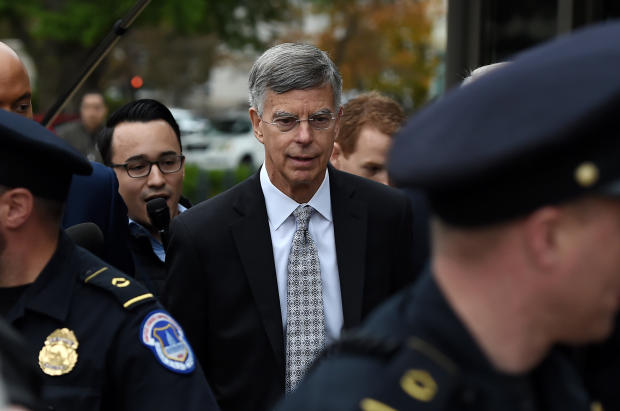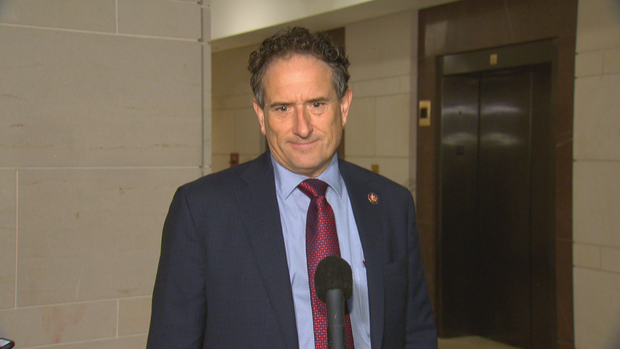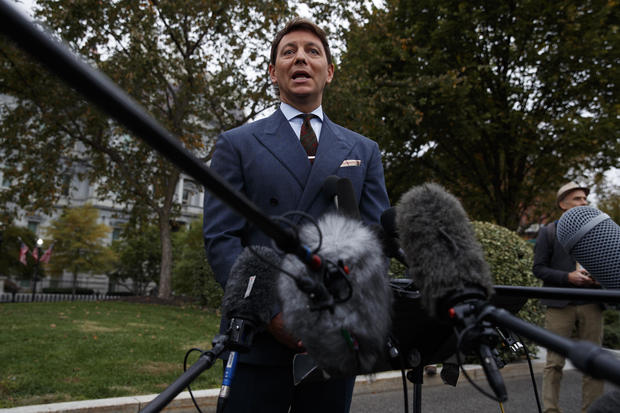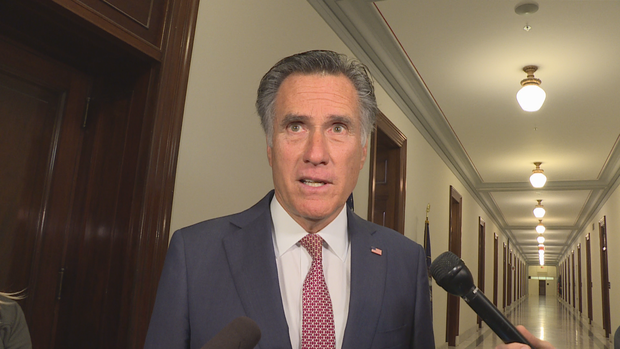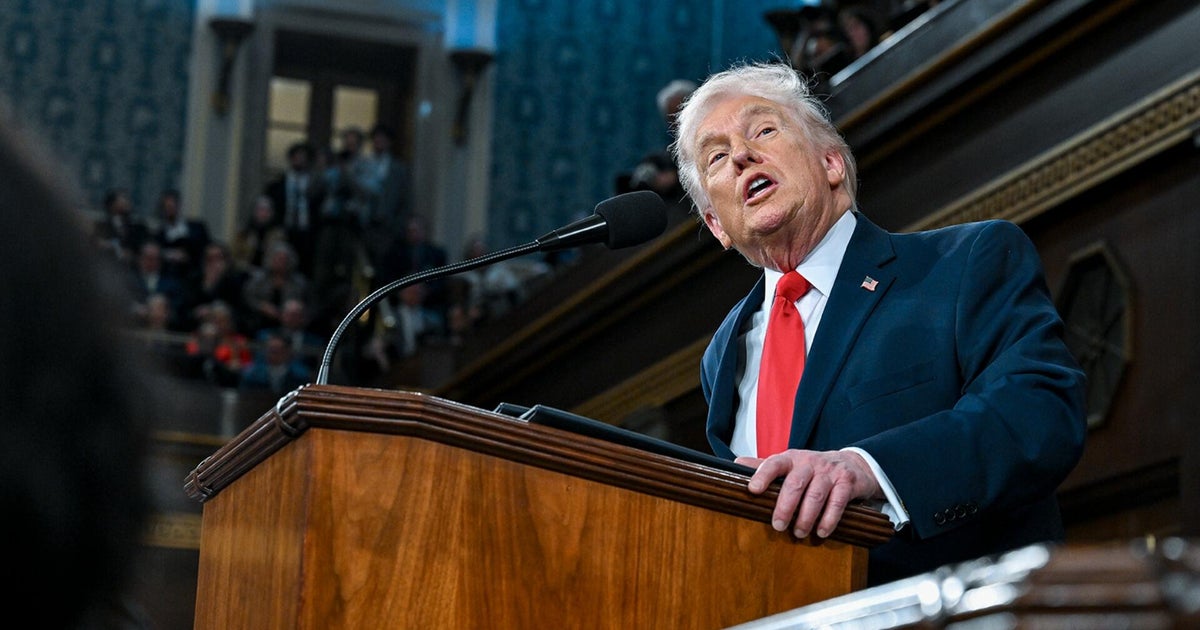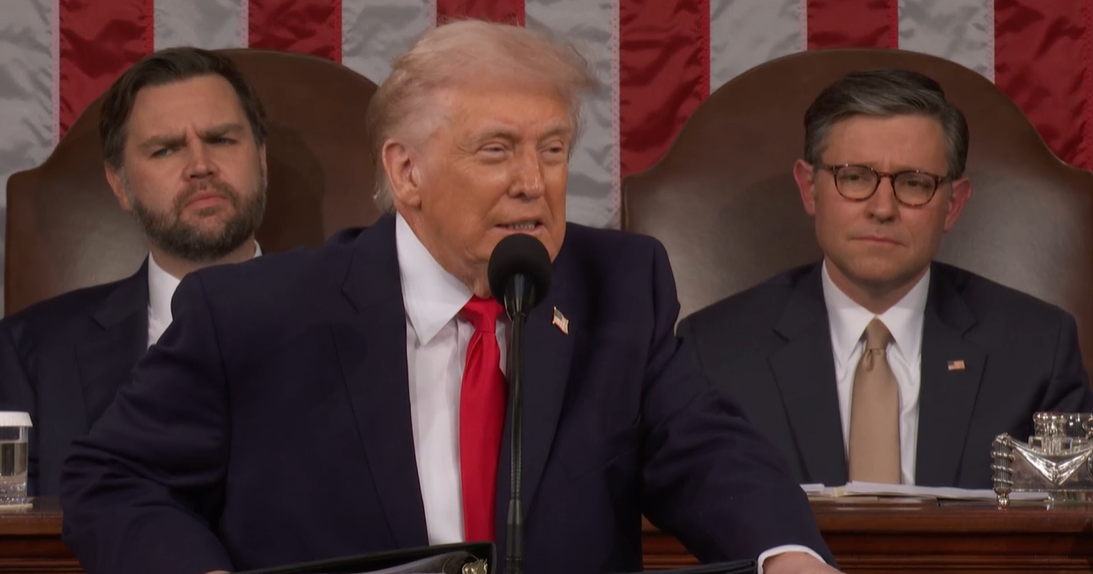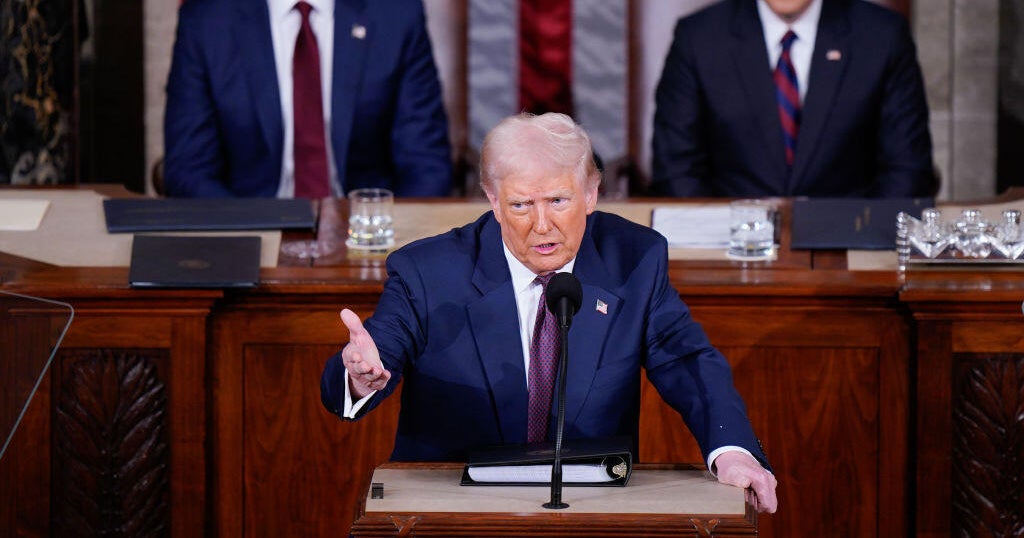Top diplomat in Ukraine gave "devastating" testimony, Democrats say
Key facts and latest news
- William Taylor, the top U.S. diplomat in Ukraine, testified before lawmakers behind closed doors for more than nine hours.
- In a 15-page opening statement, Taylor testified that he grew increasingly alarmed over efforts by U.S. officials to pressure Ukraine into investigating President Trump's rivals.
- Lawmakers who heard the closed-door testimony were stunned, audibly gasping at points.
- On the July 25 call between Mr. Trump and Ukrainian President Volodymyr Zelensky, Mr. Trump urged Ukraine to investigate Joe Biden.
Washington -- The top U.S. diplomat in Ukraine delivered a "damning" 15-page opening statement on Capitol Hill on Tuesday alleging a direct link between a delay in U.S. military aid for Ukraine and the country's willingness to investigate President Trump's political foes.
William Taylor, the U.S. chargé d'affaires in Kiev, is a key witness in the investigation into the Ukraine scandal at the center of the impeachment probe. In messages with other diplomats from August and September released earlier this month, Taylor raised concerns about the U.S. withholding hundreds of millions of dollars in military aid to Ukraine, saying it was "crazy to withhold security assistance for help with a political campaign."
Taylor testified before the House committees leading the impeachment probe, and Democratic lawmakers emerging from the meeting described his account as "damning" and "devastating." CBS News obtained a copy of his opening statement later in the day.
Representative Andy Levin, a Democrat from Michigan, said the U.S. diplomat's account was "very troubling."
"All I have to say is that in my 10 short months in Congress -- it's not even noon, right? -- and this is my most disturbing day in Congress so far," Levin said.
"He gave a very detailed opening statement that was very devastating to Donald Trump," said Congressman Ted Lieu, Democrat from California.
Taylor, a career diplomat who was once ambassador to Ukraine, emerged as a key figure in the scandal upon the release of messages he sent to Gordon Sondland and Kurt Volker, two other diplomats at the center of the controversy who have testified before the committees. The State Department tried to block Taylor's deposition on Tuesday, prompting House Democrats to issue a subpoena to compel his testimony.
Taylor's account does not contradict the events described by previous witnesses who testified before the House Intelligence, Foreign Affairs and Oversight Committees, Democrats said, but rather corroborates the established timeline and fills in the gaps with details others had not provided.
"He was a meticulous note keeper, which made his testimony, I believe, all the more credible," said Congressman Gerry Connolly, a Democrat from Virginia. "That was his lifelong habit. When a phone conversation or meeting occurred, he would go to his notebook, record it or memorialize it."
In particular, multiple members pointed out Taylor provided details that Sondland, the ambassador to the European Union, said he did not recall when he testified before the committees last week.
"I walked away with the impression Sondland is going to have some explaining to do," said Illinois Democrat Raja Krishnamoorthi.
New Jersey Congressman Tom Malinowski, himself a former political appointee at the State Department under President Obama, attributed it to Taylor's experience as a career diplomat.
"In my experience the difference between career folks and political appointees is the career folks take very good notes," he said. "It's just the most thorough accounting we've had of the timeline. It fills in details that some other witnesses, somehow, forgot about."
At least one House Republican said the testimony did nothing to advance the Democratic theory that Mr. Trump withheld foreign aid or a meeting with the Ukrainian president in an attempt to get the country to investigate his political rival, former Vice President Joe Biden.
"I don't see anything that has advanced, the quid pro quo or the promise of anything with foreign aid," said Congressman Mark Meadows, Republican from North Carolina. "There's no one who can be intellectually honest and come out of that deposition and suggest otherwise."
Taylor is the ninth witness to testify in the House Democrats' impeachment probe, and seems to have left more of an impression on some members, including Illinois Democrat Mike Quigley.
"What did Alfred Hitchcock say? Movies are life without the boring parts. Right? This is testimony without the boring parts," he said. -- Rebecca Kaplan. Julia Boccagno, Olivia Gazis and Kimberly Brown contributed reporting.
White House denounces "triple hearsay"
Tuesday, 7 p.m.: White House press secretary Stephanie Grisham issued a statement blasting Taylor's testimony and House Democrats.
"President Trump has done nothing wrong -- this is a coordinated smear campaign from far-left lawmakers and radical unelected bureaucrats waging war on the Constitution," the statement said. "There was no quid pro quo.
"Today was just more triple hearsay and selective leaks from the Democrats' politically-motivated, closed door, secretive hearings.
"Every day this nonsense continues more taxpayer time and money is wasted. President Trump is leading the way for the American people by delivering a safer, stronger, and more secure country - the do-nothing Democrats should consider doing the same."
Taylor wraps up marathon deposition
7:22 p.m.: After nine and a half hours of testimony, Taylor has left the Capitol, leaving through a back exit and avoiding questions.
Taylor says Ukraine aid was directly tied to investigations
6:05 p.m.: In his statement, Taylor describes a concerted effort to use U.S. leverage to get Zelensky to commit to opening investigations into debunked allegations of Ukrainian interference in the 2016 U.S. election, as well as the gas company Burisma, which had hired former Vice President Joe Biden's son in 2014. Taylor said these efforts came via an "irregular, informal channel of U.S. policy-making" consisting of Rudy Giuliani, special envoy Kurt Volker, Energy Secretary Rick Perry and U.S. Ambassador to the E.U. Gordon Sondland.
Taylor's statement was first published by The Washington Post.
Taylor's interactions with Sondland in particular shed new light on the events at the center of the Ukraine scandal. Taylor told lawmakers Sondland "said that President Trump wanted President Zelenskyy 'in a public box' by making a public statement about ordering such investigations." He said he slowly came to realize that a delay in U.S. military aid to Ukraine was explicitly tied to the Ukrainians' willingness to state publicly that it would launch investigations into 2016 and the Bidens, which he described as "extremely troubling."
Read the full statement here.
Graham to introduce resolution condemning "illegitimate" House practices
5:08 p.m.: Republican Senator Lindsey Graham said Tuesday that he would introduce a resolution condemning "illegitimate" practices in the House impeachment inquiry, calling the process a "sham." Graham also said he would not comment on Taylor's testimony because he condemned the House's process.
"I will not comment on anything coming out of the House until they do it the right way. This is a sham. This is un-American," Graham said.
Earlier on Tuesday, Graham said that he agreed with Mr. Trump's characterization that the impeachment inquiry was a "lynching." -- Grace Segers
McConnell denies telling Trump his Ukraine call was "innocent"
3:29 p.m.: McConnell denied telling Mr. Trump his July phone call with the Ukrainian president was "innocent," as the president indicated earlier this month.
Asked on Tuesday whether he believes the president has handled the U.S. relationship with Ukraine "perfectly," McConnell told CBS News he had not spoken to the president about the July 25 call.
When CBS News asked on Tuesday if the president was lying about the supposed interaction, McConnell replied, "You'd have to ask him. I don't recall any conversations with the president about that phone call." -- Nancy Cordes
Read the full story here.
McConnell calls Trump's word choice "unfortunate"
2:21 p.m.: Senate Majority Leader Mitch McConnell mildly criticized Mr. Trump's use of the word "lynching," saying the president's word choice was "unfortunate."
"Given the history in our country I would not compare this to a lynching," McConnell told reporters on Capitol Hill. -- Grace Segers
Taylor's testimony was "damning" and elicited gasps from both parties
1:32 p.m.: Taylor's opening statement was "lengthy," and his testimony was "very dramatic" and "detailed," according to members of the House committees conducting the impeachment inquiry. Another source said that Taylor's testimony was "damning."
A source who was in the room confirmed to CBS News that there were sighs and gasps -- from both Democrats and Republicans -- in reaction to Taylor's opening statement. -- Rebecca Kaplan, Olivia Gazis and Nancy Cordes
Democrat on Taylor's testimony: "My most disturbing day in Congress so far"
1:05 p.m.: Representative Andy Levin, a freshman Democrat from Michigan, emerged from the hearing room earlier where William Taylor is testifying, and said the U.S. diplomat's account was "very troubling."
"All I have to say is that in my 10 short months in Congress -- it's not even noon, right? -- and this is my most disturbing day in Congress so far," Levin said. -- Kimberly Brown
White House spokesman defends Trump's "lynching" comment
12:16 p.m.: Hogan Gidley, the principal deputy White House press secretary, claimed the president was not equating the impeachment inquiry with the brutal killing during Jim Crow.
"The president is not comparing what's happened to him with one of our darkest moments in American history," Gidley told reporters on the White House driveway. "What he is explaining clearly is the way he has been treated by the media since he announced for president."
"What the president has done for the African American community is something no president has ever done in my lifetime," Gidley claimed. -- Stefan Becket
Jeffries calls on Trump to apologize for "lynching" tweet
10:49 a.m.: House Democratic Caucus Chairman Hakeem Jeffries, of New York, condemned Mr. Trump for his tweet comparing the impeachment inquiry to a "lynching."
"Thousands of African Americans were slaughtered during the lynching epidemic in this country for no reason other than the color of their skin. The president should not compare a constitutionally mandated impeachment inquiry to such a dangerous and dark chapter of American history," Jeffries said. "I hope that he will apologize."
Majority Whip Jim Clyburn, the highest-ranking African American in the House, said on CNN that lynching is "one word that no president ought to apply to himself."
Illinois Congressman Bobby Rush, who has introduced a bill to make lynching a hate crime, called on Mr. Trump to delete the tweet.
"You think this impeachment is a LYNCHING? What the hell is wrong with you?" Rush said, quoting Mr. Trump's tweet. "Do you know how many people who look like me have been lynched, since the inception of this country, by people who look like you. Delete this tweet." -- Grace Segers
You think this impeachment is a LYNCHING? What the hell is wrong with you?
— Bobby L. Rush (@RepBobbyRush) October 22, 2019
Do you know how many people who look like me have been lynched, since the inception of this country, by people who look like you. Delete this tweet. https://t.co/oTMhWo4awR
Bill Taylor arrives for deposition
9:30 a.m.: At about 9:22 a.m., Bill Taylor, the chargé d'affaires at the Ukrainian embassy in Kiev, arrived for his closed-door deposition before the House Intelligence, Oversight and Foreign Affairs Committees. He did not answer questions from reporters as he walked by. -- Rebecca Kaplan
Trump compares impeachment inquiry to "lynching"
8:00 a.m.: President Trump claimed Democrats are "lynching" him, carrying out their impeachment inquiry without due process. He tweeted early Tuesday, "So some day, if a Democrat becomes President and the Republicans win the House, even by a tiny margin, they can impeach the President, without due process or fairness or any legal rights. All Republicans must remember what they are witnessing here - a lynching. But we will WIN!" Mr. Trump tweeted early Tuesday.
Republican Senator Lindsey Graham, of South Carolina, defended Mr. Trump's tweet, declaring it to be an "accurate" assessment.
"This is a lynching and in every sense this is un-American," Graham said. -- Emily Tillett
Volker testified Giuliani "poisoned" Trump's view of Ukraine
8:45 a.m.: Kurt Volker, the former special representative to Ukraine, told the House committees leading the impeachment probe that he believed President Trump's attorney Rudy Giuliani had poisoned Mr. Trump's view of Ukraine. One of Volker's goals was to give the president a more positive view of the country.
Volker testified that he pushed for an Oval Office meeting for Ukrainian President Volodymyr Zelensky because he thought if Mr. Trump met him in person, it would help sway the president's opinion of Ukraine. -- Arden Farhi
House Democrats block GOP resolution to censure Schiff
Monday, 7:12 p.m.: House Democrats on Monday blocked a vote on Republican resolution to censure House Intelligence Committee Chairman Adam Schiff over his handling of the impeachment inquiry into President Trump.
Lawmakers voted to table the censure resolution, effectively killing it, by a vote of 218 to 185. The vote fell completely along party lines, with independent Representative Justin Amash, a former Republican, siding with the Democrats.
The measure was introduced last week by GOP Representative Andy Biggs of Arizona, the chairman of the conservative House Freedom Caucus. It cited several reasons for Schiff's censure, including his recitation of an embellished account of the call between Mr. Trump and the president of Ukraine during a congressional hearing, his accusations that Mr. Trump was colluding with the Russians and contact between committee staff and the whistleblower. -- Caroline Cournoyer
Read the full story here.
Romney calls Mulvaney's comments a "real concern"
Monday, 6:06 p.m.: Republican Senator Mitt Romney of Utah said Mulvaney's comments on the delay in Ukraine aid were a "real concern," but urged his fellow senators to "not jump to any conclusions" ahead of a potential trial in the Senate.
"Obviously what he said in the press conference was of real concern because he said, in effect, that they were holding up funding going to Ukraine, in part based upon a desire to have Ukraine carry out an investigation with regards to the 2016 election," Romney told reporters on Capitol Hill. "And in holding up funds to a foreign nation, particularly one that's under military threat, in order to fulfill a political purpose is a real problem."
Romney said he thinks most senators "are looking at what's going on in the House with interest, obviously with concern."
"But ultimately we may well become a jury. And if that's the case, I think people want to make their own decision and not jump to any conclusions at this early stage," he said. -- Alan He
2 officials to testify in the impeachment inquiry this week
Monday, 4:55 p.m.: In deference to services honoring the late Congressman Elijah Cummings, only two witnesses will appear before the committees leading the impeachment inquiry this week, according to an official working on the investigation:
- William Taylor, the chargé d'affaires in Ukraine who raised concerns about withholding military aid, is expected to appear in closed session on Tuesday.
- Deputy Assistant Secretary of Defense Laura Cooper is expected to appear in closed session on Wednesday.
Cummings, who died last week after battle long-standing health problems, will lie in state in Statuary Hall in the Capitol on Thursday, and his wake and funeral will be held Friday in Baltimore. -- Rebecca Kaplan
Schumer inquires about protections for whistleblower
Monday, 3:50 p.m.: Senate Minority Leader Chuck Schumer is asking how the director of national intelligence and intelligence community inspector general are protecting the identity of the whistleblower who filed the complaint about the president's dealings with Ukraine.
In a letter to Acting Director Joseph Maguire and Inspector General Michael Atkinson, Schumer said the president's statements have put the whistleblower at risk of being exposed.
"The President has also incorrectly stated that he has a right to 'confront' the whistleblower, and has said that he is 'trying to find out' the whistleblower's identity -- notwithstanding the fact that whistleblower anonymity is protected by law," Schumer wrote.
Schumer said he fears Mr. Trump "may disclose the whistleblower's identity or cause it to be disclosed." If it is, Schumer said the pair "must be prepared to protect the whistleblower from both workplace reprisal and threats to his or her personal safety."
"I understand that some security measures may already have been taken, but I fear that risks may increase in the event that the whistleblower's identity is disclosed," the Democratic leader wrote. "I also note reports that one or more additional whistleblowers may be coming forward, creating added security concerns. I therefore ask that you inform me regarding your plans to ensure that these whistleblowers are adequately protected." -- Stefan Becket
OMB officials won't comply with House depositions, acting director says
Monday, 12:35 p.m.: Russ Vought, acting director of the Office of Management and Budget (OMB), tweeted Monday morning that he and Mike Duffey, another top OMB official, won't comply with deposition requests.
"I saw some Fake News over the weekend to correct," Vought wrote on Twitter. "As the WH letter made clear two weeks ago, OMB officials - myself and Mike Duffey - will not be complying with deposition requests this week. #shamprocess"
Vought took over for Mulvaney as acting director when Mulvaney became acting White House chief of staff. OMB was involved in delaying the release of military funding for Ukraine. -- Kathryn Watson
The uncharted road to the impeachment and removal of a president
Monday, 12:13 p.m.: The three other times in which lawmakers filed articles of impeachment against presidents, targeting Andrew Johnson, Richard Nixon and Bill Clinton, offer insight into the mechanics of Congress' extraordinary constitutional recourse to unseat the nation's leader through democratic means.
The precedent they set is limited, however. One of the impeachment campaigns did not lead to a Senate trial and none of them resulted in a president's conviction and removal from office. Because of this, part of the path to a president's removal through an impeachment process remains uncharted territory.
With the help of experts of American politics and constitutional law, we have outlined what we know -- and don't know -- about impeaching and removing a sitting president.
Read more here.
